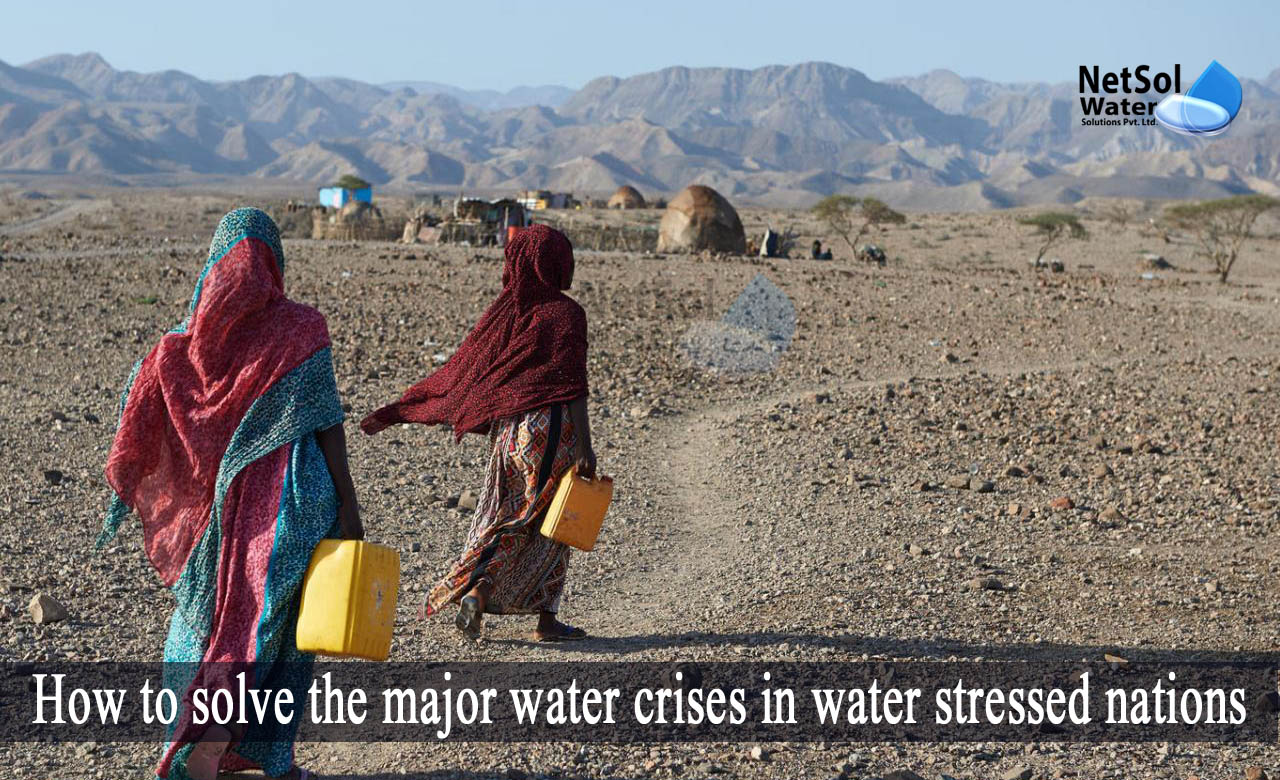Water is becoming a crucial element because of the worrisome rate at which groundwater is vanishing. In the modern world, access to clean water has become more important than ever. Our earth is 70% covered by water, and we always assume there is plenty of it.
The water we use to drink, bathe in, and irrigate our farm fields is known as freshwater, yet it is exceedingly scarce. Freshwater makes up only 3% of the world's total water supply, and two-thirds of that is either frozen glaciers or inaccessible to humans.
Worldwide, billions of people experience water scarcity, and over 1.1 billion people lack access to clean water. Now, the question arises! How can we solve these major water crises in nations which face water scarcity?
How to solve the major water crises in water stressed nations?
Before being dumped into aquatic bodies, produced wastewater can be treated. The treated wastewater can be utilized again if the levels are within the safe limit.
Many industries produce wastewater and discharge it directly into the body of water. As a result, the water becomes polluted and unsafe for human consumption. Wastewater may wreak havoc, if it is not properly treated. Thus, finding a suitable industrial wastewater treatment is essential. Reusing wastewater and properly treating it are essential to preserving it, for future generations.
Importance of wastewater treatment plants
A wastewater treatment plant may help residential, commercial and industrial facilities, become more environmentally friendly and compliant with their wastewater disposal. There are numerous kinds of wastewater treatment facilities, which can handle sludge entering at different stages, and lessen its toxicity depending on the type of wastewater created.
Let's look at a few techniques to maintain various plant types as well as, a more in-depth understanding of these plant types.
Wastewater that hasn't been treated shouldn't build up in any way. It is made up of organic materials that have decayed. Long-term storage of organic materials can result in the production of harmful gases, which can harm the ecosystem.
In addition, it contains other hazardous substances that could be dangerous if released into the environment. So, it is crucial to clean and eliminate wastewater from its source. Additionally, reuse is a fantastic choice because of the shortage of water.
Although, a treatment plant's general operation is consistent, there are several types of wastewater treatment systems. The effluent source entering the plant and their operating characteristics, are typically taken into consideration.
Types of wastewater treatment plants
The following are the different types of wastewater treatment plants:
· Sewage Treatment Plants or STP
· Effluent Treatment Plant or ETP
· Common and Combined Effluent Treatment Plant or CETP
Sewage Treatment Facility
Sewage treatment is a multi-stage procedure created to handle domestic waste from homes, businesses, malls, hospitals, and other facilities. Greywater (effluent from bathtubs, sinks, and other non-toilet plumbing fixtures), and blackwater(wastewater from toilets containing faecal matter), can both be included in sewage wastewater.
Effluent Treatment Plants
ETP is a wastewater treatment procedure (WWTP) used to treat wastewater produced by chemicals, textiles, pharmaceuticals, etc. Along with treating domestic sewage, it is crucial in the treatment of industrial wastewater. The ETP treats pollutants such as suspended particles, heavy metals, oil & grease, and inorganic materials, etc.
For industrial parks to flourish ecologically, an ETP's development and construction are essential. These facilities are made to deal with highly polluting effluent that is more difficult to decompose.
Unlike sewage treatment, every industry everyday releases wastewater with a variety of contaminants. Therefore, individualized treatment plants and frequent monitoring, are essential for effective treatment.
Common effluent treatment facility
Common effluent treatment plants have been established and are in operation, in a number of industrial clusters around India. They provide collective treatment improvement, cost savings on land, and effluent treatment cost reduction for small-scale industrial facilities, which cannot afford separate treatment plants.
Any CETP must have the best possible operating conditions for wastewater treatment, to meet discharge regulations.
CETPs are divided into two groups.
Homogenous: Businesses in that industrial area produce comparable commodities, for instance, tanneries, paper, etc.
Heterogeneous:Grouping of industries that produce quite different types of contaminants. Chemical, dairy, soft drink, tannery, pharmaceutical, etc. are a few examples.
Maintenance of Wastewater Treatment Facilities
A wastewater treatment facility needs routine maintenance and daily system checks, to operate effectively. Failure to do so may result in pipeline blockages and possibly the failure of some components.
High COD/BOD levels, odour problems, treated effluent not meeting regulatory toxicity limits, and many other things could also interfere with the plant's ability, to operate smoothly.
Get best manufacturersof wastewater treatment plants in India!
Netsol Water is one of the top businesses offering effective wastewater management solutions. Our advanced wastewater treatment facilitiesaid in the treatment of wastewater, reducing organics, inorganics, FOGs, TDS levels, heavy metals and other microscopic organisms, with the elimination of unpleasant odours, etc.
Netsol Water is Greater Noida-based leading water & wastewater treatment plant manufacturer. We are industry's most demanding company based on client review and work quality. We are known as best commercial RO plant manufacturers, industrial RO plant manufacturer, sewage treatment plant manufacturer, Water Softener Plant Manufacturers and effluent treatment plant manufacturers. Apart from this 24x7 customer support is our USP. Call on +91-9650608473, or write us at enquiry@netsolwater.com for any support, inquiry or product-purchase related query.



